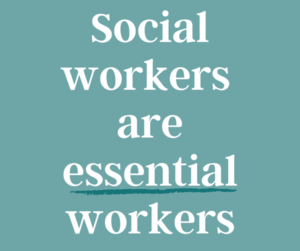 Looking for Schoolchildren at Risk When Students are Staying at Home
Looking for Schoolchildren at Risk When Students are Staying at Home
Michael Cappiello, president-elect of NASW-NYS chapter discuss the decrease in reported child abuse cases and why the numbers are not capturing the whole picture.

 Looking for Schoolchildren at Risk When Students are Staying at Home
Looking for Schoolchildren at Risk When Students are Staying at Home
Michael Cappiello, president-elect of NASW-NYS chapter discuss the decrease in reported child abuse cases and why the numbers are not capturing the whole picture.
 Readers sound off on social workers, the Yankees and graduations
Readers sound off on social workers, the Yankees and graduations
Dr. Paulette Sansone honors social workers during the pandemic in this opinion piece.
A Chat with NASW-NYS Executive Director Dr. Samantha Fletcher
Executive Director, Dr. Samantha Fletcher, discusses how the chapter is engaging with, and providing resources for, its members during this time of COVID-19.
 Social workers answer the call during COVID-19 pandemic
Social workers answer the call during COVID-19 pandemic
Samantha Fletcher, Executive Director of the New York chapter of the National Association of Social Workers, explained how NASW-NYS is helping during the pandemic.
 While coronavirus has children home and families strained, abuse and neglect could rise
While coronavirus has children home and families strained, abuse and neglect could rise
Board members, Michael Cappiello and Billye Jones address child abuse and neglect during COVID-19.
 During the COVID-19 pandemic social workers have been designated “essential workers” by the U.S. Department of Health and Human Services and the U.S. Department of Homeland Security. The Association of Social Work Boards, the Council on Social Work Education, and the National Association of Social Workers are continuing to advocate for change. Take time to learn about our actions here: https://buff.ly/34cPMmO
During the COVID-19 pandemic social workers have been designated “essential workers” by the U.S. Department of Health and Human Services and the U.S. Department of Homeland Security. The Association of Social Work Boards, the Council on Social Work Education, and the National Association of Social Workers are continuing to advocate for change. Take time to learn about our actions here: https://buff.ly/34cPMmO
NASW-NYS also have a COVID-19 Resource here: https://naswnys.org/covid-19/